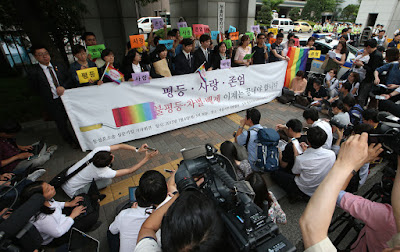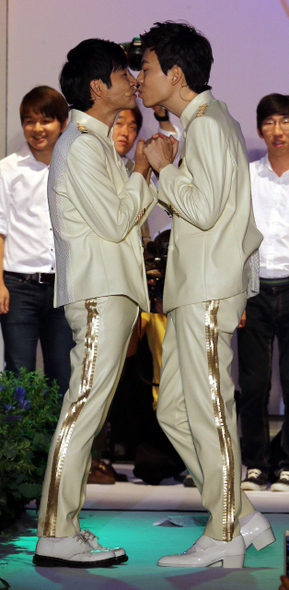The Gay Christian Debate
July 25th, 2015
"Does the Bible condemn homosexuality?"
Last Saturday evening, a public debate was held at the Hamilton Hotel in Itaewon, Seoul, between Pastor Paul Warren from Sojourn Fellowship (Incheon) and Reverend Daniel Payne from Open Doors Metropolitan Community Church (Seoul), with moderation by Calon Webb. The topic of the debate was the position of the Bible on homosexuality. This topic has undeniably come under close scrutiny in recent months in South Korea, as the tension has mounted between some vocal conservative Christian groups and the country's LGBTQ community, especially after this year's Korea Queer Culture Festival on June 28th.
I attended the debate and took six pages of notes over the course of the 2.5-hour event. The purpose of this post is to recap the main points made by each pastor as succinctly as possible, and I will add some of my own thoughts at the end. The debate was conducted in English, and it was videotaped, so that a recording with Korean subtitles can be made available online in the near future.
Both pastors were allowed a twenty-minute opening statement. Reverend Daniel (henceforth DP), who takes an affirming position on homosexuality (i.e. the Bible does not condemn it), began by stating that both he and Pastor Paul (henceforth PW) approached the question under the assumption that the Christian Bible is the inspired and authoritative word of God, and thus that whatever the Scripture says and means should be followed by professing Christians. DP stated that the Bible is a very complicated book; it has historical, cultural, and linguistic contexts that must be understood. And homosexuality in its modern, twenty-first century context is different from homosexuality as addressed in the six most-cited "anti-gay" passages of the Bible. For example, the sin of Sodom was the sin of inhospitality, not homosexuality per se; also, the Levitical laws against homosexuality were a reference to pagan ritualistic temple prostitution. In these passages and in others, DP stated that homosexual activity of a very specific sort was condemned, but not committed homosexual relationships of the kind we may find today.
PW's opening statement led with the idea of a "back to Creation" ethic of sexuality that could be identified as a common theme throughout the entire Bible. For example, the account of the creation of the world in Genesis highlights the importance of male and female complementarity as part of God's design for humankind, and Jesus' teachings on marriage in the Gospels upholds this. PW countered DP's interpretations of the Sodom and Gomorrah story and the Levitical laws by insisting on no ambiguity in the wordings of what was the sin in question, and similarly challenged DP's explanations of certain Greek words used by the Apostle Paul in his letters to the early church.
Each pastor was then given ten minutes for a rebuttal. DP clarified that the Bible does clearly bless heterosexual relationships and marriage, but is merely silent on the issue of their modern homosexual counterparts. The Bible's sayings regarding marriage should be taken as a descriptive account of the cultural context, but not a proscriptive set of unalterable rules. PW re-emphasized that the descriptions of sins in the Bible were, when taken at face value, inclusive of any kind of homosexuality, and also added that the Bible in its entirety, and the direction it appears to point toward, should be considered in cases of modern issues like same-sex marriage.
Following the rebuttals, DP was allowed to ask PW specific questions in a cross-examination format, followed by the reverse. There was discussion of the meaning of the word "abomination" as found in Leviticus and the case of eunuchs mentioned in the New Testament. Most relevantly, PW reiterated that the Apostle Paul should have been aware of consensual adult homosexual relationships (from ancient Greek writings), so what kinds of relationships that are under question today are not actually new. And DP was asked to define a Biblically-based sexual ethic, so he referenced a passage in the book of Galatians that identifies godly actions and relationships as those that might produce "spiritual fruits", which does not restrict the relationships by gender or orientation.
After a short break, the members of the audience (totaling about fifty) were asked to submit questions to the two pastors. They were asked to clarify issues such as the Bible's stance on lesbianism, transgender people and relationships, and the literality of the Biblical ordinance to "be fruitful and multiply" (i.e. have children), among others.
Actually, the question I submitted was selected by the moderator, and I'd like to share it. I addressed my question specifically to Pastor Paul: "There are LGBTQ Christians in our churches. How do we include them in the church community without relegating them to a second-tier class of believers?" I asked this because I believe that regardless of what any church's official position on homosexuality is, the fact is that LGBTQ people exist and some want to be a part of the community; yet too often the solution is to allow LGBTQ Christians to be members but prohibit them from marrying or taking on leadership positions -- in other words, they are discriminated against. PW's response was, "We don't want to kick anybody out or say that anyone is less. Some might advocate celibacy for LGBTQ Christians. But according to the Bible, there are no second-tier believers; believing and repentance always go together." DP's response was rather pointed: "Your implication is that if I am in a gay relationship, then I can't be a true Christian. The traditional side can't truly love LGBTQ people who are in relationships, despite their intentions, from this point of view. The sad thing is that I've experienced, in Korea, young queer Christians who have ended their lives because of the church's traditional teaching."
It became a little bit personal at this point, but otherwise, the debate was completely civil. There were more audience-submitted questions about the importance of procreation, how an LGBTQ individual should deal with an unaccepting Christian family, how Biblical interpretation has changed through history, and whether or not God hates gays. In closing, each pastor was given ten minutes for a closing statement. Both of them used their time to cite certain eminent Biblical scholars from both pro-gay and anti-gay sides who interpreted the six most relevant Biblical passages in different ways. DP's closing remark: "The church has changed its mind about slavery, an institution undoubtedly supported by the Bible, and hopefully in the future it can do the same about homosexuality." PW's closing remark: "Sin should not prevent us from being Christian. The struggle we all have with sin is guaranteed. I welcome you all to take up your crosses to follow Jesus."
- - -
The debate ended with an audience poll on whether they thought the Bible condemned homosexuality or not. I was not counting the hands raised, but it seemed that all three times the poll was conducted (before the debate, in the middle, and at the end), the audience was split about three ways between Yes, No, and Decline to Respond. There was mingling afterward, and then a large contingent went out to eat a late dinner (including both pastors). All in all, I enjoyed the debate for the intellectual stimulation, and I learned a few new things. (As a religion major in undergrad, I have already read quite a bit on the subject of Christianity and homosexuality, but there is always more to discover.)
I realized that the event was certainly catered toward English-speakers, and thus the handful of non-English-speaking Koreans in the audience may have felt somewhat lost during the debate. Also, there were no references to the current same-sex marriage debate in Korea. But the video is now available on YouTube (click here!) and the Korean translation are being worked on, so when those are made available, I will edit this post to include them. To be perfectly honest, the Gay Debate has been going on for decades in the US and in Western Christianity, but in Korea and the rest of Asia it has only just begun, so in my opinion, this kind of exchange ideas needs to happen in Korean, and soon.
Lastly, I am fully aware that this blog post left out huge chunks of the debate -- I'm especially sorry that I could not include full discussions of the excellent audience questions at the end -- but if you are curious to know more about what was said, leave a comment! I would be happy to send you my six pages of notes...
- - -
P.S. I should also put in a plug for Open Doors, the church that I have been attending this summer. It is a gay-affirming church affiliated with the Metropolitan Community Church denomination and offers a weekly Sunday service in English with Korean translations, located in Itaewon. Any Koreans or foreigners in Seoul are welcome to attend, regardless of religious background, sexual/gender identity, or interest in Christianity! Haha. I've learned some good stuff here in the past few weeks and made new friends; I will be sorry to leave in August.

